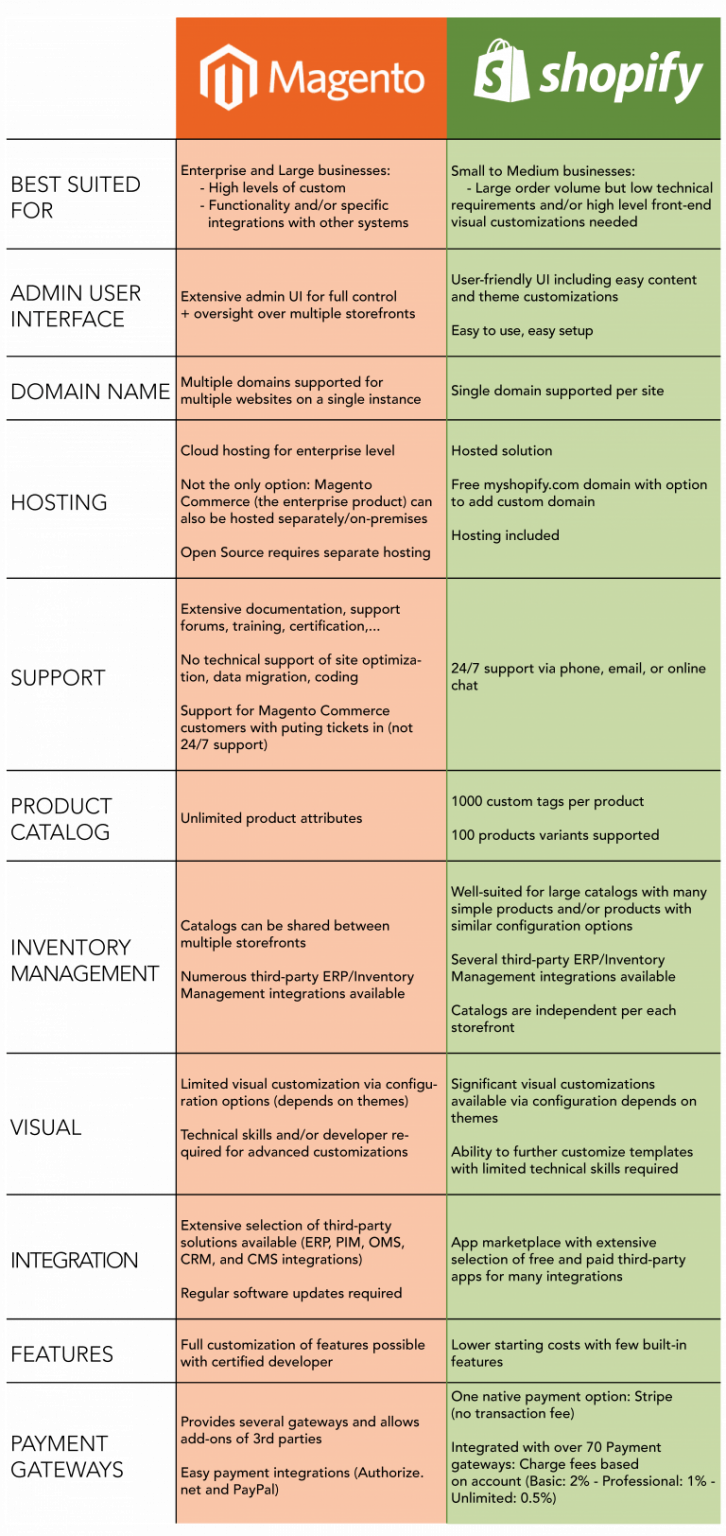January 14, 2019
Want to know which eCommerce platform helps you best achieve your business goals?
Making the final decision on which platform to use is difficult. Your decision will deeply impact future customer experience and scalability options. On top of that, you’re considering fixed costs, variable fees, catalog and product architecture, and more.
Rather than waste precious time and energy, atmosol created this handy guide as a shortcut to eCommerce success.

In today’s digital age, establishing a strong online presence is essential for the success of any business. E-commerce platforms have become the cornerstone of this online presence, offering entrepreneurs and retailers the tools to create, manage, and optimize their online stores. Among the many choices available, two platforms stand out as popular: Magento and Shopify. In this blog post, we’ll delve into both platforms’ features, pros, and cons to help you make an informed decision for your e-commerce venture.
Magento: The Open-Source Powerhouse
Magento, an open-source e-commerce platform, has gained a reputation for its flexibility and scalability. It offers two main editions: Magento Open Source (formerly known as Magento Community) and Magento Commerce (previously Magento Enterprise).
Pros of Magento:
-
Customization: Magento provides a high degree of customization. Developers have access to the source code, enabling them to tailor the platform to unique business needs.
-
Scalability: Magento excels in handling large inventories and high levels of traffic. It’s the go-to choice for businesses with ambitious growth plans.
-
Feature-Rich: The platform comes with an extensive list of features, including advanced SEO capabilities, multi-store management, and powerful marketing tools.
-
Community Support: Magento boasts a large and active community of developers, designers, and users who contribute to its continuous improvement.
Cons of Magento:
-
Complexity: Magento’s flexibility comes at the cost of complexity. It can be challenging for non-technical users to set up and manage.
-
Cost: While the open-source edition is free, the Commerce edition and the costs associated with hosting, development, and maintenance can be significant.
-
Technical Expertise: Operating a Magento store effectively requires technical expertise. Businesses often need dedicated developers or agencies for ongoing support.
Shopify: The User-Friendly Solution
Shopify has gained immense popularity for its simplicity and ease of use. It offers an all-in-one solution, handling hosting, security, and updates for your online store.
Pros of Shopify:
-
User-Friendly: Shopify is incredibly user-friendly, making it an ideal choice for beginners. Its drag-and-drop interface simplifies store setup and management.
-
Hosting and Security: Shopify handles hosting and security, eliminating the need for users to worry about server maintenance or data breaches.
-
App Ecosystem: Shopify’s app store offers a wide range of plugins and extensions that can add extra functionality to your store with a simple click.
-
Mobile Ready: With a mobile-responsive design, Shopify stores are optimized for a seamless shopping experience on smartphones and tablets.
Cons of Shopify:
-
Customization Limits: While Shopify allows customization, it’s not as flexible as Magento. Users may face limitations when trying to implement highly specific features.
-
Monthly Costs: Shopify operates on a subscription model, with monthly fees that can add up over time. Additional costs include transaction fees for using external payment gateways.
-
Scalability Concerns: While Shopify is suitable for small to medium-sized businesses, some larger enterprises might find its scalability options limited compared to Magento.
Choosing the Right Platform
Ultimately, the choice between Magento and Shopify depends on your business’s specific needs and your level of technical expertise. If you require extensive customization and have the resources for technical management, Magento could be your best bet. On the other hand, if you’re seeking a user-friendly solution that handles technical aspects for you, Shopify might be more appropriate.
Remember that migrating from one platform to another can be complex and time-consuming. It’s crucial to thoroughly evaluate your requirements before making a decision. Regardless of your choice, Magento and Shopify have proven their worth in the e-commerce landscape, helping countless businesses thrive in the digital marketplace.
